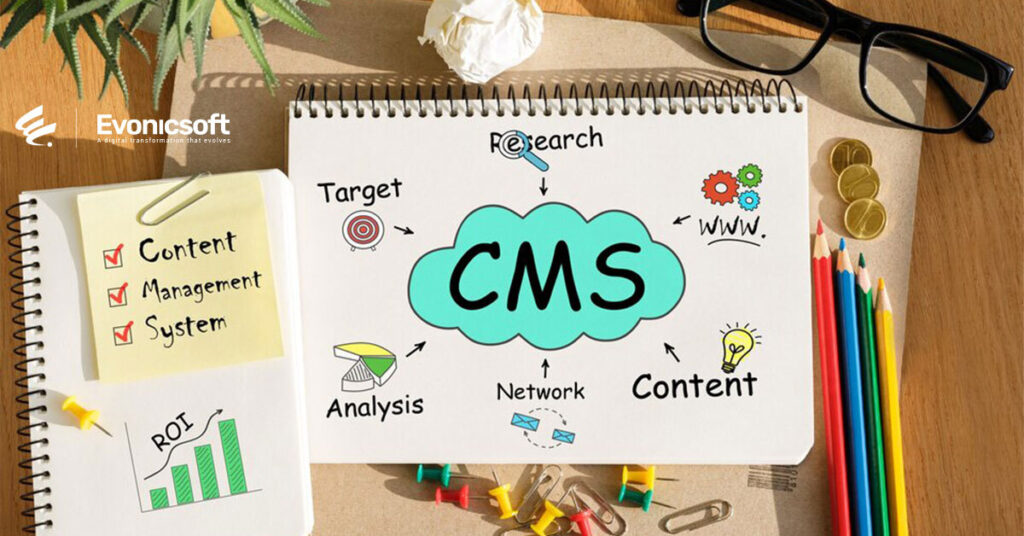
CMS’s (Content Management Systems) Influence on Web Development & CMS Website Development
- Sami Ul Hassan
- 29/08/2023
- Digital, Website Development
Introduction
In today’s digital age, having a captivating online presence is non-negotiable, whether you’re an individual or a business entity. Picture websites as the virtual storefronts that shape our perception of brands and personalities. To achieve this, seamless user experiences, engaging content, and dynamic functionalities are the cornerstones. But behind the scenes, there’s an unsung hero empowering many of the websites we frequent – Content Management Systems (CMS) or CMS Website Development.
Think of CMS as the ingenious force driving the scenes, making the magic happen without us even realizing. Have you ever wondered how websites effortlessly update content, maintain their slick appearance, and introduce interactive features? That’s the charm of a CMS at work. But it doesn’t stop there. Our journey takes a fascinating turn as we delve into the world of CMS website development.
In this blog, we’re about to embark on an exploration of CMS website development. We’ll uncover the very essence of what a CMS constitutes and the myriad of wonders it’s capable of. Buckle up as we unravel the mysteries of how these systems are meticulously crafted. And as if that isn’t enough, we’ll unveil the profound influence CMS wields over the way we experience the web today. So, let’s dive into this captivating realm where technology, creativity, and user-centric design converge!
CMS Website development (Content Management Systems) Understanding
Image a content management system (CMS) as your digital assistant, simplifying every step of crafting, organizing, and sharing information online. It’s like having an invisible helping hand that magically simplifies complex tasks. Thanks to its user-friendly interface, you don’t need to be an IT whiz in order to manage content online – these CMS platforms act like website superheroes making website development smooth as silk ribbon.
Envision popular CMS names like WordPress, Joomla, and Drupal; they’re the rockstars of CMS technology. And for online sellers looking to sell online with Shopify as the hub – whether you’re blogging, showcasing artwork, or setting up digital shops – they are there for you. So, when you see polished websites out there, know there’s probably some kind of CMS at work in their background!”
Benefits of Using a CMS
1. Ease of Use:
Ever felt as if managing and creating websites required a tech degree? No longer! CMS platforms offer simplicity at your fingertips. No matter if you are experienced or just starting out in technology, CMS platforms have you covered!
Imagine drag-and-drop editors that allow you to move things around like virtual building blocks; ready-made templates that save you from designing from scratch; content creation tools that make creating content simple; all these goodies tucked neatly away within user-friendly CMS platforms – giving anyone who wishes to build an outstanding website the confidence that they can do it themselves!
2. Efficiency:
The process of creating and releasing content is streamlined by CMS website development. Teams can work effectively to manage and update information thanks to built-in capabilities like scheduling, version control, and multi-user collaboration.
3. Customization:
A variety of themes, templates, and plugins are available on CMS platforms, enabling users to alter the appearance and functionality of their websites. Websites can be customized to meet unique needs and branding requirements thanks to this flexibility.
4. SEO-Friendly:
Many content management systems (CMS) are built with search engine optimization (SEO) in mind. They offer plugins and solutions that help websites rank higher in search results by assisting with content optimization for search engines.
5. Economical:
Building a website from the ground up can be costly and time-consuming. The creation of CMS considerably lowers costs by offering pre-made solutions that may be altered to fit unique requirements.
Process of Developing a CMS
1. Requirement analysis:
Understanding the client’s requirements is the first step in the development process. This entails determining the intended audience, content categories, functionalities, and aesthetic preferences.
2. Platform Selection:
The right CMS platform is selected based on the needs. This choice is influenced by various elements, including scalability, security, and the availability of plugins.
3. Design and Template Customization:
The themes and templates of the CMS of choice are altered to coordinate with the client’s branding. This step entails developing an interface that is both aesthetically pleasing and user-friendly.
4. Content Creation:
The CMS allows for the creation and organization of content, which can include text, photographs, videos, and other types of media. This procedure is made simpler by the WYSIWYG (What You See Is What You Get) editor.
5. Functionality Enhancement:
The CMS’s functionality is increased through the addition of plugins, modules, or extensions. This might encompass contact forms, social network integration, e-commerce capabilities, and more.
6. Testing:
Extensive testing is done to make sure the website works properly on various hardware, web browsers, and operating systems. Any defects or problems are located and fixed.
7. Deployment:
After testing is over, the website is put on a live server and made available to the general public.
8. instruction and Support:
Users receive instruction on using the CMS to maintain and update content. Additionally, upgrades and ongoing help are provided for technical problems.
The Function of CMS in Contemporary Web Interfaces

The creation and management of websites have undergone a revolution thanks to CMS advancement. Its influence spans numerous fields and objectives:
1. E-commerce:
Online stores are powered by CMS platforms like Shopify, WooCommerce, and Magento, which enable companies to efficiently manage their products, inventories, payments, and customer interactions.
2. Blogging and Content Creation:
Websites like WordPress provide content creators and bloggers with a user-friendly setting in which to publish their work. Plugins make it simple to integrate statistics, commenting systems, and social sharing.
3. Corporate websites:
CMS options are tailored to meet the demands of organizations, offering features like team pages, service listings, client testimonials, and case studies.
4. Nonprofit Organizations:
CMS platforms make it easy for organizations to display their initiatives, promote their missions, and raise money.
Conclusion

Content Management Systems (CMS website development) have revolutionized website development thanks to their accessibility, utility, and scalability. Now they form the core of online experiences for both businesses and individuals aiming to create unique online brands.
Consider it this way: CMS platforms are unsung heroes behind the scenes who shape how websites appear and feel. Their assistance has allowed us to design websites people enjoy visiting with user-friendly interfaces that enable effortless site management. Furthermore, these systems also give plenty of customization options so your site truly reflects who you are!
As CMS evolves and offers us new ways to interact with websites, CMS is making the digital world even more engaging! Therefore, we should give a huge thank you for making digital life even more thrilling!






